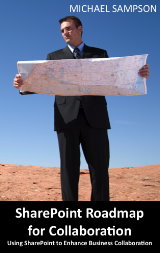 For several years, I've encouraged Michael to write a book on Lotus Notes for collaboration. I even contacted IBM press to see what's involved - a lot. Michael shared that in the absence of significant market awareness of Lotus Notes he did not think a book around Notes made as much business sense as a book around SharePoint. (Michael's been a long time Lotus Notes user and advocate; we continue to use Notes to collaborate.) For the past few years, Michael has been focused on the use of SharePoint for collaboration. Michael's just published his second book on collaboration; this one's called "SharePoint Roadmap for Collaboration." I had an opportunity to be a part of the review process and I think the book is excellent. If the examples were changed, it could easily be called "Lotus Notes Roadmap for Collaboration." What's important are the principles, which are true regardless of platform.
For several years, I've encouraged Michael to write a book on Lotus Notes for collaboration. I even contacted IBM press to see what's involved - a lot. Michael shared that in the absence of significant market awareness of Lotus Notes he did not think a book around Notes made as much business sense as a book around SharePoint. (Michael's been a long time Lotus Notes user and advocate; we continue to use Notes to collaborate.) For the past few years, Michael has been focused on the use of SharePoint for collaboration. Michael's just published his second book on collaboration; this one's called "SharePoint Roadmap for Collaboration." I had an opportunity to be a part of the review process and I think the book is excellent. If the examples were changed, it could easily be called "Lotus Notes Roadmap for Collaboration." What's important are the principles, which are true regardless of platform. I've asked Michael to write a guest post for the Notes on Productivity blog, because having gone through the copy of his second book, the themes are just as relevant for Notes people as for SharePoint people. I highly recommend that you buy a copy of Michael's second book, both to learn about SharePoint and to read about the principles of effective collaboration that Michael addresses.
So ... here's Michael ...
SharePoint Roadmap for Collaboration: My Second BookMichael's book is self-published and not yet on Amazon... and it won't be for at least 6 months. You will have to buy it directly from www.sharepointroadmap.com, but then at US$39 including postage and packaging, it's a steal compared to what Michael would charge for a day of consulting! If you need more time to explore the book, download and read Chapter 1.
Like Eric, I'm a strong advocate that technology needs to be used in a way that improves productivity and effectiveness. Unlike Eric, I've chosen to focus my research and consulting over the past 2.5 years on SharePoint. During this time, I have written a book for Microsoft Press about how business users can embrace the capabilities of SharePoint to support team collaboration (see Seamless Teamwork), and just recently, I have written and self-published a new book called SharePoint Roadmap for Collaboration.
With a title like that, obviously this new book is about SharePoint ... not Lotus Notes. So why has Eric gifted me the opportunity to write about it here, on Notes on Productivity? For a couple of reasons ...
First, the ideas and concepts in SharePoint Roadmap for Collaboration are transferable to the Lotus Notes world. Although the specific examples in the six focal chapters are about SharePoint, you can apply the principles to the use of Lotus Notes. Here's an example. Chapter 5 is about engaging with business people to understand how they work, and how the technology of SharePoint can be used to enhance their work. But the focus is on engagement -- what engagement is, what engagement looks like, and why there is a high cost when you only pretend to engage. If you have Lotus Notes at your place of work, and you are charged with making it work well for your business users, then Chapter 5 is just as valuable for you as for a SharePoint person. Take and embrace the principle of engagement, and ignore the term SharePoint.
Second, I actually talk about Lotus Notes in Chapter 4, the governance chapter. The very first reason that governance is necessary is so that firms can "avoid the mistakes of yesteryear". I draw a comparison between what the technology of Lotus Notes makes possible and what the technology of SharePoint makes possible, and then offer this conclusion:
"Many people consider Lotus Notes a massive failure. Whether the failure of Notes is a marketing failure, whereby Microsoft out-marketed IBM and created the perception that Notes is a failed product, or whether it is actually to do with the technology remains to be seen. Just as there are firms that have done great things with Lotus Notes, so there are firms that have done great things with SharePoint. And vice versa. The point is that if you believe that Lotus Notes was a failure, I propose that unless you do things differently with SharePoint, you will get the same mess that you achieved with Lotus Notes."(page 93)
You'll note that I don't argue or advocate that Notes sucks. I argue that if you (a) think that Notes sucks, and (b) think that SharePoint will by itself solve the "Notes problem", that you are in for a rude shock.
Finally, regardless of what platform you use at work -- Lotus Notes or SharePoint -- it's the application of that technology to pressing problems and opportunities at work that makes the difference. It's not the technology per se, although the capabilities of the technology has some bearing on what's possible (as I talk about in Chapter 3, where I evaluate what SharePoint 2007 can do to support team collaboration). My new book is about how to approach an advanced technology like SharePoint (or Lotus Notes) and how to make a positive difference in the lives of the people you work with and support at your firm.
Take care ... and my best.
Michael Sampson, [email protected] www.michaelsampson.net







Discussion/Comments (10):
Hi Eric. Some good points made from an interesting perspective. Given the writer seems to have a clear knowledge of both Lotus Notes and Sharepoint and doesn't seem to be taking a view that one product is technical;l;y superior to the other... The fact that he has chosen to focus his efforts on Sharepoint suggests to me that MS clearly are out-marketing IBM (at least up to this point). Its a shame we cannot attract more talent to write these sorts of books from a Notes perspective. This, unfortunately, just gives more credibility to Sharepoint. We cant even get someone to write a technical book on Xpages!
Michael Sampson (http://www.sharepointroadmap.com): 7/21/2009 10:58:20 PM
Hi Peter ... thanks for your comment. Yes, I know both products, and the purpose of the book isn't a comparative technical analysis. It's about using what you've got (or are getting) to get a great business return.
And in terms of an IBM book ... I tried to contact IBM Press about a book (albeit on Connections), but got NOTHING back ... so gave up. And that was also after my book agent tried too.
M.
Ben Poole (http://benpoole.com): 7/22/2009 12:58:27 AM
Interesting stuff, and I can personally vouch for how well Michael expresses his thoughts on collaboration.
On the subject of authorship, whilst there is no shortage of writing talent out there in the Lotus world, the sad fact of the matter is that no-one wants books on Notes (as Michael discovered). If IBM aren't publishing, no-one else is going to bother!
Ian Armstrong (): 7/22/2009 1:32:59 AM
So, another book for me to buy :) Looking forward to it.
I remember years ago when I first started at Lotus I wanted to pick up a book that explained to me, as an end-user (I hadn't yet made the jump to Notes developer), how to get the best out of Lotus Notes. Nothing. Nada. About as far as I got were a couple of Lotus' yellow manuals. Uuurgh.
I also see lots of people loitering in bookstores browsing over 'sexy' books about Facebook, Twitter, Google, MS Office (OK, maybe not sexy). All these users clearly want is a book that explains what the technology can do for them. Period. Why can IBM Lotus not release some books that say "Hey, I'm Notes, I'm cool too, read me!".
I wait for that day to come. Am I foolish?
Michael Sampson (http://www.sharepointroadmap.com): 7/22/2009 1:56:47 AM
Hi Ben ... thanks for the vote of confidence! I'm remembering back to the 7 Pillars workshop in June 2005 in New York ... it was neat to work with you and the others that day.
My sense on whether people want books on Notes or not ... is ... that perhaps on Quickr and Connections, but a book on Notes would need to be a different focus now. That's mainly to do with maturity (years in market) and challenges (stay or migrate).
M.
Michael Sampson (http://www.sharepointroadmap.com): 7/22/2009 1:58:55 AM
Ian ... looking forward to putting a copy in the mail to you.
Did you ever see the book, "The Lotus Notes Idea Book"? That was one of my favorites about Notes in the late 90s.
And I love your line ... "All these users clearly want is a book that explains what the technology can do for them." You've got it ... I really believe that, and that's what drove the writing of Seamless Teamwork.
So if IBM Press won't fund such a book, who will?
M.
Patrick Picard (): 7/22/2009 7:03:44 AM
Grabbed the sample chapter to have a look
Brent Henry (http://www.enterinfosystems.com): 7/22/2009 7:43:53 AM
I troll the shelves at my local book store frequently, looking for new texts that have arrived.
I make my living developing for Notes/Domino but my last book purchases were VB.NET, .NET Entity Framework (this is very interesting stuff), and a couple of Adobe Flex books.
There are books on every obscure programming language, ajax framework, and CMS but nothing on Notes. There used to be some end user "how to" books, but these have disappeared.
Doesn't make sense if you are trying to attract new developers. Wake up IBM.
John Rowland (http://enterprisingnotes.blogspot.com): 7/22/2009 9:24:06 AM
Yep. There has been much recent discussion about making Notes App Dev accessible to end users/power users again. Need books that make Notes Dev "sexy" and targeted at these types of users, not just "programmers".
Eric/Michael, I don't know from experience, but have read that anything beyond rudimentary apps in MOSS require "steeper" skills. Is there any appeal for ND in that regard?
Eric Mack (http://www.EricMackOnline.com): 7/22/2009 10:41:57 AM
It may be true that MOSS requires steeper skills, but that is only one of the decision criteria that a firm uses when choosing a dev and collaboration platform. And in comparison to other factors, it's quite insignificant.
Discussion for this entry is now closed.